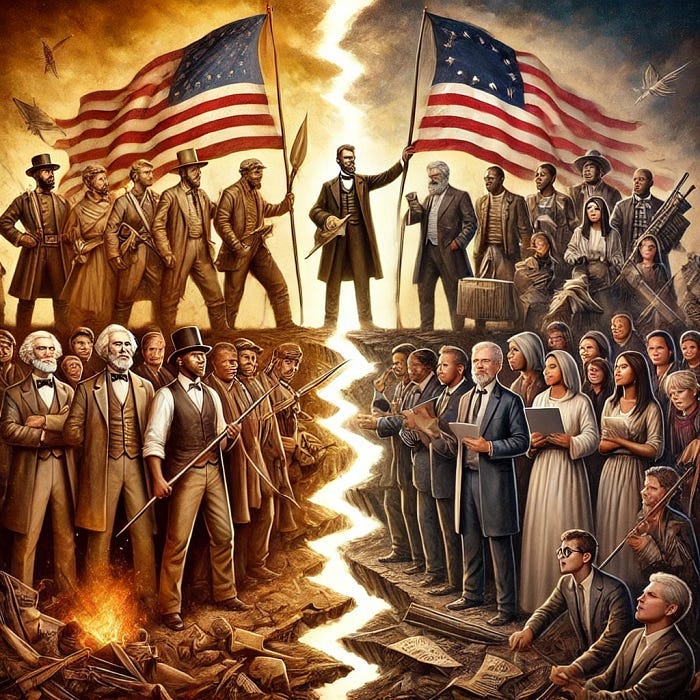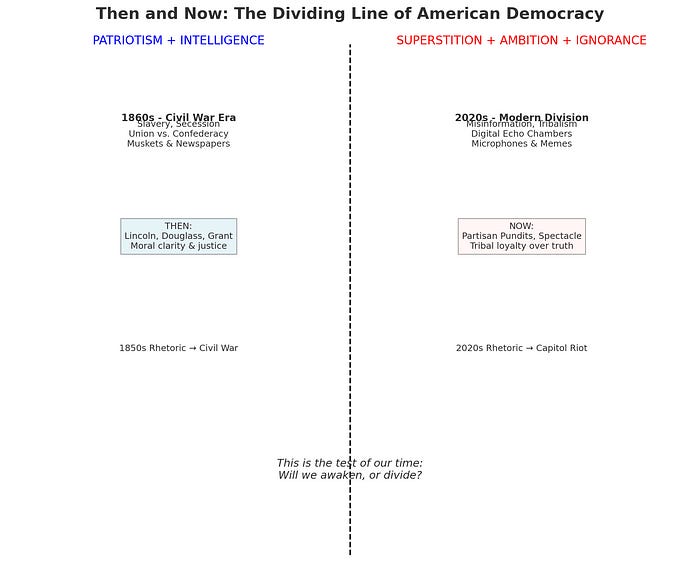U.S.A. A Republic Worth Defending
Ulysses S. Grant’s Enduring Warning to America
“If we are to have another contest in the future of our national existence, the dividing line will be between patriotism and intelligence on the one side, and superstition, ambition, and ignorance on the other.” — Ulysses S. Grant
In a world echoing with misinformation, political upheaval, and ideological warfare, the timeless voice of Ulysses S. Grant rings with fresh urgency. This is not a voice conjured merely from history books, but one invoked to address the conditions of our modern republic — a republic once again confronting its own fractures.
The Cost of Complacency
As Union General and later President, Grant was no stranger to division. He led the nation through the bloodiest conflict in its history and then through one of its most fragile peace times. When he spoke of “another contest,” he did not speak lightly. He understood that the enemy of the Union may return not with cannons, but with confusion. Not with armies, but with ambitions disguised as patriotism.
Today, the battlefield has shifted from the physical to the ideological. Our maps remain intact, but our collective truth does not. Media echo chambers, digital misinformation, and deepening tribal loyalties have eroded a sense of shared reality. “The muskets are now microphones,” and the fight for the soul of America is being waged in the minds and hearts of its citizens.
Two Americas: One Choice
Grant’s imagined future is now our present. On one side: reason, humility, and a love of country rooted in service and self-reflection. On the other: blind loyalty, disinformation, and grievance politics. These are not just differences in opinion — they are differences in values, in how we define truth and who we deem worthy of it.
To stand by idly is to concede ground to ignorance. Grant warned of “superstition garbed as conviction,” and we now see it in movements that demonize education, idolize strongmen, and warp democratic ideals into tools of oppression. The Union soldiers did not die to see liberty twisted into license.
A Charge to the Present
Grant’s call is not simply for reflection but for action:
To citizens, he says: Be vigilant. Defend truth. Let your patriotism be guided by intelligence.
To leaders, he declares: Do not seek popularity — seek principle. Conscience over crowd.
To educators and journalists, he affirms: You are the torchbearers of liberty. Guard it with honesty.
And to the youth, he entrusts the unfinished work: Build better. Think deeper. Serve humbly.
This is not the twilight of America. This is a test. And in that test, Grant reminds us: the real enemy is not abroad, but within. The silence of the principled. The passivity of the informed. The withdrawal of those who believe the fight isn’t theirs.
🔄 Echoes of Disunion: Then and Now
To understand the weight of our current political division, one must look not only forward, but backward. The United States has faced a national rupture before — a rupture so violent it cost over 600,000 lives and shook the foundation of the republic. That conflict, the Civil War, was not simply a matter of North versus South, but of two competing visions for what America ought to be.
Then, it was slavery, secession, and the sanctity of the Union. Today, it is misinformation, institutional erosion, and the integrity of democracy itself. The language may differ, but the stakes feel hauntingly familiar.
⚔️ From Blue and Gray to Red and Blue
The division that once split families and communities along state lines now slices through digital networks, households, and even congregations. The secession of states has given way to the psychological secession of belief systems. We no longer live in different regions; we live in different realities.
The Civil War was fought with muskets. Today, the war is fought with microphones, misinformation, and manipulated algorithms. Yet the power of these tools to ignite hatred and suspicion is no less potent.
🧠 Leadership Then, Leadership Now
“The dogmas of the quiet past are inadequate to the stormy present. As our case is new, so we must think anew, and act anew.” — Abraham Lincoln
During the Civil War, the republic was held together not merely by military force but by moral clarity. Abraham Lincoln spoke to the better angels of our nature. Ulysses S. Grant enforced the will of the people through resolve, not revenge. Frederick Douglass reminded a fractured nation of the moral arc that demanded justice.
“It is easier to build strong children than to repair broken men.” — Frederick Douglass
Today, such moral leadership feels rare. Performative politics and partisan grievance dominate the airwaves. Few speak across the divide with the language of principle. We are not yet at war — but the absence of reasoned leadership in a time of deep polarization is itself a crisis.
🔥 The Role of Rhetoric and Violence
“A house divided against itself cannot stand.” — Abraham Lincoln
In the 1850s, heated rhetoric over slavery and state’s rights escalated into physical violence. In 2021, the United States Capitol was breached by citizens who believed they were defending their country — based on lies. This is not a return to history; this is a warning from it.
When political speech becomes apocalyptic, and when leaders substitute truth for expedience, the threshold for conflict lowers. We must ask: what truths are we willing to defend, and what lies are we willing to challenge?
⚖️ A Democracy on Trial, Again
The Civil War tested whether a nation “conceived in liberty and dedicated to the proposition that all men are created equal” could long endure. Today, the test remains: Can a nation survive when its own people reject the shared facts, mutual trust, and institutions needed to hold it together?
We now face what Grant foresaw: a contest not between armies, but between patriotism and intelligence on one side, and superstition, ambition, and ignorance on the other. The contest is not yet lost — but it is underway.
A Union Worth the Fight
“Let us have peace.” — Ulysses S. Grant
“The Union,” Grant said, “is still worth defending.” Not as a nostalgic banner, but as a living promise. One that must be kept, not by one party, race, or generation, but by all who still believe in liberty, dignity, and justice.
Let our new dividing line be one of awakening. Let it call forth not hatred, but vigilance. Because, as Grant reminds us: Patriotism without intelligence is blind. And intelligence without action is betrayal.
The republic still stands. The question is: will you stand with the Republic?



